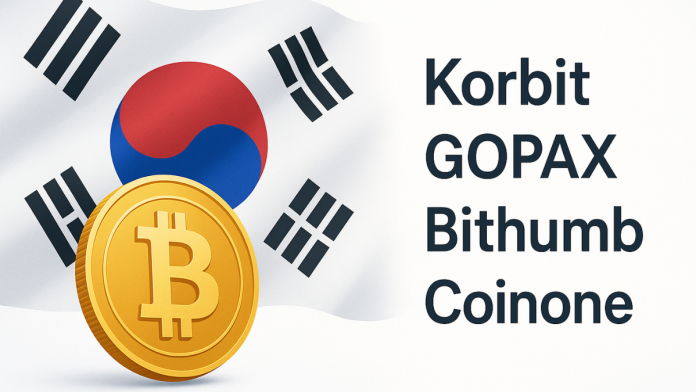South Korea is preparing to issue large fines and penalties against several major crypto exchanges after months of regulatory checks. The Financial Intelligence Unit (FIU) has completed a year-long series of on-site inspections at the country’s biggest trading platforms, focusing on how they followed Know-Your-Customer (KYC) rules and Anti-Money-Laundering (AML) laws under the Special Financial Transactions Act.
With inspections finished, the FIU is now moving to the penalty stage. Local reports say sanctions will be issued in the same order as inspections were completed, placing Korbit, GOPAX, Bithumb, and Coinone first in line.
These exchanges are expected to face penalties for customer verification issues and failures to report suspicious activity. The same law was applied earlier when the FIU penalised Dunamu, the operator of Upbit, with a three-month block on onboarding new customers and a 35.2 billion KRW (about $26 million) fine for KYC failures and reporting lapses.
Why South Korea Is Taking Firm Action
To reduce risks, lawmakers strengthened requirements for digital-asset firms. Every crypto operator must verify user identities, report suspicious transactions, and keep accurate records. The rules also allow the FIU to carry out surprise inspections and issue heavy penalties when companies fail to follow the law.
Penalties under the Special Financial Transactions Act can be severe. They may include fines up to five times the amount of illegal profits, warnings, suspensions, or even criminal action in serious cases. Because of this strict environment, crypto exchanges in South Korea operate under close supervision, similar to traditional financial institutions.
The FIU’s recent inspection cycle is part of its effort to ensure exchanges meet these expectations. The checks reviewed how platforms confirmed customer identities, monitored trading activity, and reported suspicious behaviour. These steps are central to preventing money laundering and other illegal financial activity.
Satellite images expose Iran’s ‘shadow fleet’ trading oil in South China Sea despite U.S. sanctions
Korbit, GOPAX, Bithumb, and Coinone Under Review
Korbit, GOPAX, Bithumb, and Coinone are now waiting for the FIU’s final decisions. These exchanges recently went through detailed on-site inspections that checked their systems, procedures, and overall compliance.
The inspections reviewed onboarding steps, identity verification, suspicious activity reports, and whether the exchanges had strong tools to detect risky transactions. Regulators also examined how each company handled customer data and how they reacted to warning signs linked to illegal activity.
Earlier in the year, the FIU completed its review of Upbit. In that case, Dunamu received a disciplinary warning, a three-month block on new customer registrations, and a 35.2 billion KRW fine for not fully enforcing KYC rules and for reporting lapses. This outcome is now seen as a key reference for what may happen to the other exchanges.
These exchanges play a major role in South Korea’s crypto market and serve large numbers of users. Any penalty—whether financial or operational—could impact how they run. The FIU’s decisions will also indicate how consistently the rules are being applied across the industry.
A Strict Crypto Environment Guided by Tough Laws
South Korea’s crypto environment is known for its strict rules. The country treats crypto trading with the same seriousness as traditional banking and requires exchanges to follow strong safeguards to prevent abuse.
Operators must complete full KYC checks for every customer, keep accurate transaction records, and report unusual activity without delay. They must also be prepared for sudden inspections and pass detailed reviews of their systems. The FIU has repeatedly said that digital-asset platforms must maintain the same security and transparency standards as financial institutions.
The recent round of on-site inspections and the upcoming penalties show how closely South Korea monitors the industry. They also show how quickly the FIU responds when compliance gaps are found.
With penalties for Bithumb, Coinone, Korbit, and GOPAX now moving forward, the country is applying the same rules and standards used in earlier cases. These enforcement steps highlight South Korea’s continued commitment to keeping its digital-asset market tightly controlled.


